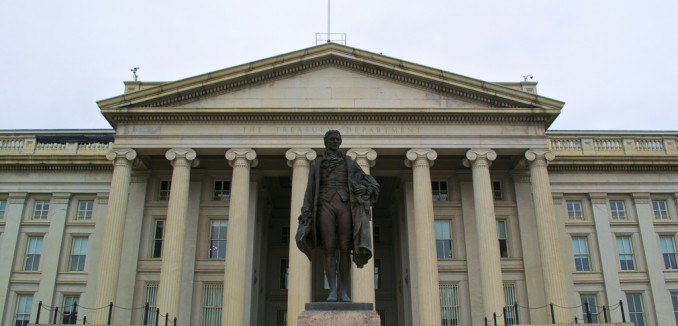Two key figures in Hezbollah’s money-laundering network were hit with sanctions by the U.S. Treasury Department on Thursday.
The department officially designated Mohamad Noureddine and Hamdi Zaher El Dine for sanctions due to their financial support and money-laundering for the Iranian-backed terror group Hezbollah, which has been designated as a terrorist organization by the United States since 1997. All of their U.S.-based assets will be frozen, and U.S. citizens and residents will be prohibited from engaging in financial transactions with them. Noureddine’s company Trade Point International S.A.R.L. was also sanctioned.
The Treasury Department has sanctioned more than 100 individuals and entities associated with Hezbollah, including networks in Lebanon and Africa.
“Hizballah needs individuals like Mohamad Noureddine and Hamdi Zaher El Dine to launder criminal proceeds for use in terrorism and political destabilization,” Adam J. Szubin, Acting Under Secretary for Terrorism and Financial Intelligence said in a statement. “We will continue to target this vulnerability, and expose and disrupt such enablers of terrorism wherever we find them.”
Treasury’s pursuit of Hezbollah has contributed to the terrorist organization’s recent troubles, Matthew Levitt, an expert on Hezbollah and a former Treasury official, wrote in The Wall Street Journal on Wednesday.
Levitt, currently the director of the Washington Institute for Near East Policy’s Stein Program on Counterterrorism and Intelligence, noted that in recent speeches, Hezbollah chief Hassan Nasrallah has denied that the terrorist organization has engaged in commercial activity, drug smuggling or money laundering. Levitt attributed these denials “to intensifying efforts by the U.S. and key allies to target Hezbollah’s drug trafficking, money laundering, and arms procurement.”
Levitt then described how the Treasury Department has attacked Hezbollah’s finances:
The Treasury Department is moving more frequently to designate terrorists and targeting key individuals and companies facilitating Hezbollah’s international misdeeds, with a focus on those with ties to the Islamic Jihad Organization, Hezbollah’s terrorist arm. The Justice Department has been working with European governments to arrest suspects in “far-ranging money-laundering probes touching Europe, South America, North America and Africa,” the Wall Street Journal reported last month. President Barack Obama signed legislation in December that aims to “thwart” the group’s “network at every turn” by imposing sanctions on financial institutions that deal with Hezbollah or its al Manar television station.
The Treasury designations — which freeze assets and impose sanctions — kicked into high gear in June when the U.S. targeted a high-level operative, Adham Tabaja and his company, al-Inmaa Group. Already, Treasury had targeted Hezbollah’s military procurement front organizations and some of the businesses that run them, such as Stars Group Holdings in Lebanon and foreign subsidiaries that supplied components for the unmanned aerial vehicles Hezbollah deploys over Syria and Israel. Treasury also targeted associates of Mr. Tabaja — one, Husayn Ali Faour, is a member of Hezbollah’s Islamic Jihad whose company supplied vehicles — and other Hezbollah procurement agents and financiers.
Both Noureddine and El Dine have worked with and aided Tabaja.
Because of legislation passed in December that targets foreign banks that do business with Hezbollah, Lebanese banks have begun to act against individuals and organizations that have dealings with Hezbollah.
According to Levitt, the investigations have caught Hezbollah’s attention:
Investigators have pursued so many Hezbollah-related cases in recent years — in particular, following the financial trail of narcotics trafficker Ayman Joumaa across continents, and actions in early 2011 targeting the Lebanese Canadian Bank under the USA Patriot Act — that the group can no longer pretend to ignore them. The trail has led to the inner circle of Hezbollah’s leadership, including Abdullah Safieddine, the group’s representative to Iran and a cousin of Mr. Nasrallah.
Earlier this month, the Treasury blacklisted Ali Yousseff Charara and his telecommunications company, Spectrum Investment Group Holding SAL, for providing millions of dollars to the terrorist organization.
However, sanctions relief that has been granted to Iran as part of the nuclear deal may make up for financial shortfalls Hezbollah suffers through Treasury’s actions. Iranian Foreign Minister Mohammad Javad Zarif met with Hezbollah chief Hassan Nasrallah in August, telling him that the nuclear agreement presented them with a “historic opportunity” to confront Israel. Iranian Defense Minister Hossein Dehghan affirmed in September that his country was committed to arming Hamas and Hezbollah. It was reported later that month that Iran boosted its funding of both terror groups in anticipation of the windfall it planned to receive through sanctions relief.
[Photo: Tyler Merbler / flickr ]




